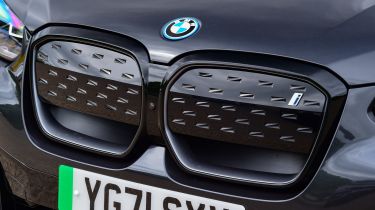BMW iX3 review: reliability & safety rating
BMW has only an average reputation for reliability, but with fewer moving parts than its petrol models, the iX3 should be a dependable family SUV
| Euro NCAP | Adult protection | Child protection | Safety assist |
|---|---|---|---|
| 5 stars (2017) | 93% | 84% | 58% |
It may come as a surprise that BMW doesn’t actually have the strongest reputation for owner satisfaction. It appears that those paying a premium for the privilege expect more from the so-called luxury brand – and often these expectations fall short. But the iX3 is a relatively new car, with new technology, so it seems unfair to tar it with the same brush. Plus, BMW's eDrive battery and powertrain technology is already used on a large scale in the likes of the i4 saloon and iX luxury SUV.
BMW iX3 reliability & problems
Historically, BMW has only recorded average performances in the annual Driver Power survey – and in more recent years it has finished nearer the bottom of the pack for owner satisfaction.
In 2023, the brand finished a lowly 21st out of 32 manufacturers, dropping from 16th the previous year. While that might sound disastrous, it still puts the maker ahead of Mercedes (25th) and Audi (30th); 22% of BMW owners experienced a fault with their cars in the first year, which is slightly better than its two main rivals.
The X3 didn’t feature in the 2023 list of the top 75 cars to own, but plenty of BMWs did. Perhaps most impressive was the ageing BMW i3’s 13th-place finish. While it’d be remiss to suggest this result might be indicative of how iX3 customers feel about their cars, it’s interesting that owners of the electric i3 are such a content bunch – despite the fact the electric supermini originally launched almost a decade ago.
BMW X3 owners in previous years have suggested their cars could be more reliable, as well as cheaper to maintain. However, as the iX3 is fully electric, with fewer moving parts and no traditional combustion engine, it is less likely to go wrong at least.
Safety
In May 2021, independent crash-testing body Euro NCAP confirmed that the five-star rating recorded by the combustion-engined X3 back in 2017 could also be applied to the iX3. This rating includes a strong adult occupant protection score of 93%, as well as 84% for child protection, but just 58% for safety assistance.
While that last score would have applied to the entry-level petrol X3, every iX3 comes with the BMW's 'Driving Assistant Professional' package, which builds in a variety of semi-autonomous driving features like adaptive cruise control, traffic-jam assistance, and an active lane-keeping aid.

